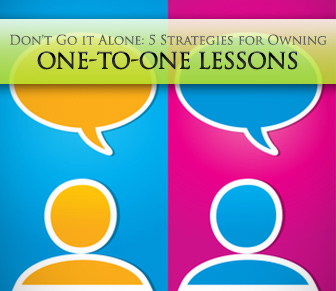
If you choose to take the plunge and perform some one-on-one tutoring lessons, don't go it alone.
Use these 5 strategies for owning and enjoying your one-on-one lessons.

How to Own One-to-One Lessons
-
1
Do Your Homework
Find out ahead of time details of the sessions. Things to find out in advance and spell out with your prospective student are:
- The duration of each session and the length of the arrangement
- The three main goals as well as the reasons the student has opted for one-on-one lessons. the student may have very specific and set goals in mind. For example many students are looking for TOEFL test preparation, Citizenship test and interview or college essay- writing. That would be very different from a more general goal like improving conversation skills or working on writing.
- Payment options as well as firming up the time and place for lessons
- If you are tutoring a child or teenager, be sure to meet with parents and go over goals, any challenges, and the specifics of the sessions
- Student needs and your planning--If this is a student you already know, planning will be simpler. If this is a new student, you will need to find out what their interests are, how driven they are, whether they want project-related work, conversation practice, etc.
-
2
Organize Project-Related Work
When you are instructing one-to-one, it is obvious that the activities you can come up with are limited. There are not a lot of games or exciting exercises that you can devise that only take two people. In order to appeal to students’ personalities and allow them to work on very specific skills, projects are a wonderful addition to any one-on-one lesson. Projects should be based on what students are really there to work on. If they are primarily interested in improving speaking skills, projects could be impromptu speaking exercises, like picking topics out of a hat, prepping for 10 to 15 minutes and then speaking on those topics with different intonations, tones, or manners of speaking. You could have them interview friends or coworkers and report back on the results. These can be as formal or informal as you like. Projects can also be as in-depth and on-going as you like or they can be simple topics in which students focus on for a class or two.
-
3
Spend Time on Individual Skills
You have a lot of time to fill in one-on-one lessons, so use it to hone each of the four skills. Take your time, and spend entire lessons on reading or listening. It's always interesting to also do in-depth work on vocabulary, expressions, intonation, pronunciation, and grammar. Get students input about what they really want to work on, and dive right in. Do grammar exercises together and provide in-depth explanations, or give them writing prompts for homework that you can then spend time editing, rewriting, and discussing grammar. Many students who prefer one-on-one lessons enjoy discussing grammar and gaining in-depth explanations for why things are the way they are.
-
4
Explore Your Options and Branch Out
There are a lot of different types of opportunities to teach ESL one-on-one. Depending on where you are located, there may be adults looking for Business English tutors, parents desperately searching for teachers for their children, or college students looking for conversation partners. If you really want to explore your hand at tutoring, perhaps stepping out of your comfort zone and trying something a little different will help you grow as a teacher. Use your network of contacts to find out what is popular in your area, and then choose to create the type of situation that is right for you. If you really enjoy one aspect of the language over another, this may be your chance to become the subject matter expert in that area. If you are a closet writer, consider providing writing lessons to high school students or adults. If you love movies and music, discover ways in which you can devise one-on-one lessons inspired by pop culture. Don't limit yourself, and really do what you love! It will show in your lessons and you will sharpen your teaching skills.
-
5
Practice Happens in Different Ways
Creating interesting and memorable practice exercises can be difficult when you only have one student, but don't let that hinder your efforts. There are still plenty of ways to engage students especially since they have your undivided attention. Just as with classroom activities, teach to your student's interests whenever possible. When you bring in topics they are passionate about, they will enjoy participating that much more. Using realia or real-world props can be an effective tool for individual students. Utilize tools from your kitchen if you are discussing food or recipes, bring in objects for the students to describe or do individualized show and tell. Be creative and let realia help you do your job.
Utilizing different types of cards can be effective to use for prompts, guessing games, or matching exercises.
You can create cards especially for your individual student or bring in the ones you use in the classroom. You can write them out on index cards, sheets of paper, or use a laminator to preserve them for long-term life. Also, make grammar exercises or homework correction fun by turning the exercises into conversations or role-play scenarios. Doing this can add a lot of spice to those otherwise dull fill-in-the-blank exercises.
Create the best interaction for one-on-one lessons by challenging students to create language on the spot, and learning from your undivided attention and explanations. You can own and enjoy your one-on-one lessons by incorporating these 5 strategies.
P.S. If you enjoyed this article, please help spread it by clicking one of those sharing buttons below. And if you are interested in more, you should follow our Facebook page where we share more about creative, non-boring ways to teach English.







